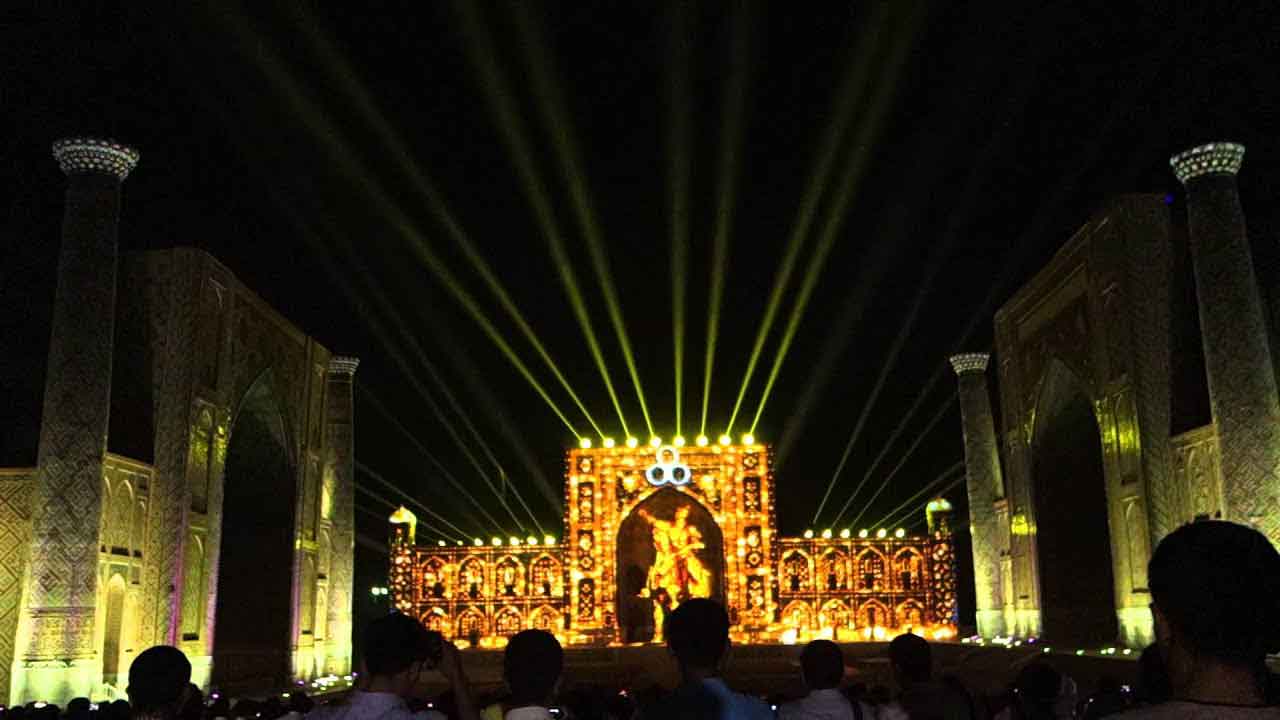
The fact of existing of such musical instruments as doumbira, koubiz, sibizga, chankawuz, chang, rubab, tanbur, uud on the wall paintings of Afrasiab and finding a 3000-year panpipe in the settlement Mouminabad in our region reveal the ancientry of the musical art of Samarkand.
Samarkand has professional art of highly developed oral traditions.This region brought up excellent masters of shashmakom, skillful singers and musicians. They are Khoji Abdulaziz Abdurasulov, his disciples Akylkhan, Levicha, Mukhiddin Kariyakubov, Kamol Khafiz, Marifatkhan, Maksadcha, Younus Rajabiy, Kari Yunus Yusupov and Sharifjan Akramov. Khojiqurbon Homidov, who was known for his full name Hoji Tam-Tam at that time, also directed several Uzbek musicians and singers.
Oriental music in Samarkand was developed in ancient times and united many nations in this region. International music festival "Sharq Taronalari", which is held every two year, increases its prestige year by year, and has become a cultural bridge between different nations and ethnicities. Music is a matter, which gathers people together, gives pleasure to souls and does not leave room for translators.
One of the main goals of the international music festival "Sharq Taronalari" is to popularize the unique national music and songs of the Oriental people, to strengthen the love for the national music art in the younger generation, to strengthen friendship among nations, and to enhance creative cooperation, cultural and spiritual ties.
Holding of this prestigious festival in Samarkand has a number of sociopolitical and cultural-enlightenment reasons. Samarkand has long been a political center not only of the East but also of world significance. For centuries it has been recognized as one of the centers of religion and enlightenment.
The International Music Festival is not only concerned with the art of performance, but also includes international scientific and creative conferences are held within the framework of this festival. They became a tradition. On these conferences people will listen to lections on the vital issues of the music art of oriental nations.
At one of the conventions, Shandor Sabo's (Hungary) report, titled "Studying the Hungarian motives" arose a great interest as a novelty. The author pointed out that the long history of the Hungarian people is connected with the ancient roots of the Sumerian and Assyrians and, in turn, has found its reflection in the cultural life of Hungary. As a proof of his thoughts, he played some songs, widely spread in Hungary, on the double finger boarded instrument "Kabur" (originated from the words "Kabuz", "Qobuz"), producing big impression. Listening to the songs played by the renowned composer on the remarkable musical instrument, one will definitely feel congeniality between it's motives and melodiousness of "tanbur" and "uud" .
The Resolution of the Cabinet of Ministers of April 25, 2019, approved the Charter of the International Music Festival "Sharq Taronalari". According to it, the Grand Prix winner is awarded with $ 10,000, and awards of $500 for nominations also indicate the growing popularity of the festival. In conclusion, it is noteworthy that the "Sharq Taronalari" international music festival has grown year after year, and the peoples and nations are helping to build a stronger relationship through music philosophy.





